 Petzlover
Petzlover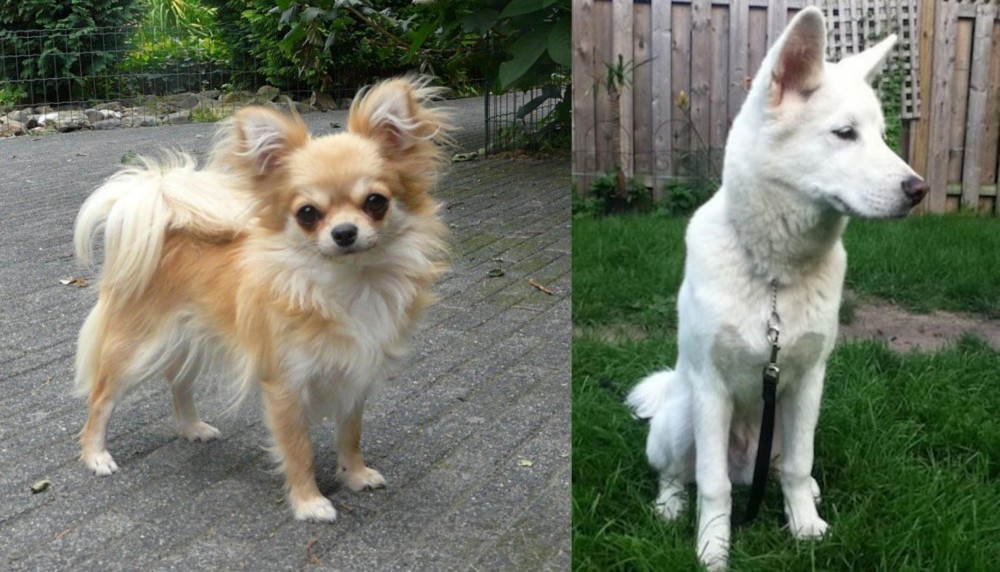 Long Haired Chihuahua is originated from Mexico but Phung San is originated from North Korea. Long Haired Chihuahua may grow 37 cm / 14 inches shorter than Phung San. Long Haired Chihuahua may weigh 27 kg / 59 pounds lesser than Phung San. Long Haired Chihuahua may live 6 years more than Phung San. Long Haired Chihuahua may have less litter size than Phung San. Both Long Haired Chihuahua and Phung San requires Moderate Maintenance.
Long Haired Chihuahua is originated from Mexico but Phung San is originated from North Korea. Long Haired Chihuahua may grow 37 cm / 14 inches shorter than Phung San. Long Haired Chihuahua may weigh 27 kg / 59 pounds lesser than Phung San. Long Haired Chihuahua may live 6 years more than Phung San. Long Haired Chihuahua may have less litter size than Phung San. Both Long Haired Chihuahua and Phung San requires Moderate Maintenance.
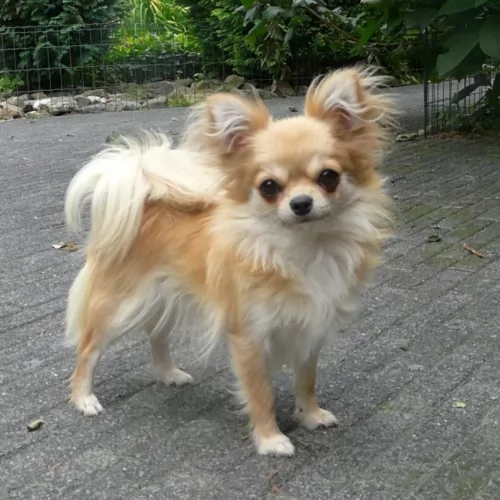 The short haired Chihuahua is such a recognizable dog breed, probably because of his tiny size, but did you know that you also get a long haired variety?
The short haired Chihuahua is such a recognizable dog breed, probably because of his tiny size, but did you know that you also get a long haired variety?
Looking quite a bit like a Pomeranian, the only difference between the two types of Chihuahua is the length of the coat.
This small dog dates back to Mayan times and while it may well have originated in Mexico, its popularity saw it becoming a sought after pet in other countries too.
To get the long haired Chihuahua, breeding programs were established and the short-haired variety was mated with other long haired toy sized dogs such as the Pomeranian and the Yorkshire Terrier.
 The Phung San, Pungsan or ‘Poongsan dog’ is native to Korea. Outside of Korea, this dog is virtually unheard of.
The Phung San, Pungsan or ‘Poongsan dog’ is native to Korea. Outside of Korea, this dog is virtually unheard of.
The origin of the dog goes back to the 16th century, but there aren’t many records of where the breed descended from. Some dog experts believe the breed descends from Siberian Laika dogs while others say they are a mix of Mastiff and Herding breeds. It is believed that the Pungsan has been used for hunting large predators.
It was during the Japanese occupation of North Korea that the breed was declared a national treasure.
The Phung San isn't recognized by any major kennel clubs.
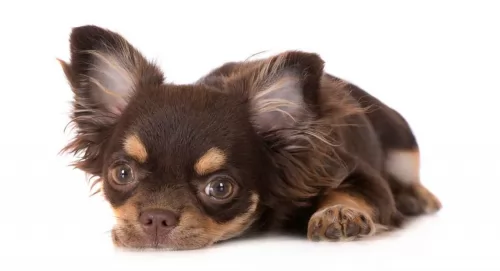 Your long haired Chihuahua will have a coat that is soft and slightly wavy. He weighs between 1 and 3kg and stands at about 15 – 23cm. He generally sheds throughout the year with a couple of heavier shedding periods during the year.
Your long haired Chihuahua will have a coat that is soft and slightly wavy. He weighs between 1 and 3kg and stands at about 15 – 23cm. He generally sheds throughout the year with a couple of heavier shedding periods during the year.
Don’t be fooled by the long, thick hair on the long haired Chihuahua as it doesn’t protect him from the cold – in fact he doesn’t tolerate the cold well at all, and is essentially an indoor dog. The ears are erect and feathery and the tail is full and plumed, lying over the back. He has a ruff on the neck, which is often described as a mane.
Chihuahuas are such bright-as-a-button little dogs and they’re intelligent too.
It’s difficult to say how a dog’s temperament will turn out, because breed, lifestyle and the type of owners can all make a dog a certain way.
Socialization and training can sometimes help with a dog that has bad genes. There are some people who say the Long haired Chihuahua is a nasty, aggressive little dog who’ll easily give you a nip but they’ve got a good reputation with many other dog lovers.
They love their own human family but may take quite a while to chill towards other people and other dogs too. They’re more ‘birds of a feather flock together’ type of dogs, preferring to get on with other Chihuahua dogs.
 This is a Spitz-type dog and it is considered to be medium to large size. He is an athletic, muscular dog with a deep chest standing at 57 to 60cm in height and weighing roughly between 25 and 30kg.
This is a Spitz-type dog and it is considered to be medium to large size. He is an athletic, muscular dog with a deep chest standing at 57 to 60cm in height and weighing roughly between 25 and 30kg.
The legs are nice and straight, the ears erect and the bushy tails curls up over the back.The head is fairly triangular in shape, the nose is black and the eyes are brown, bright and alert.
The coat is thick and comes in different shades of white and cream.
These dogs are such loyal, devoted pets. They’re independent dogs and will benefit from being trained and socialized. With this kind of training they can get on well with children in the home. They can be quite snooty with strangers but they’re good watchdogs.
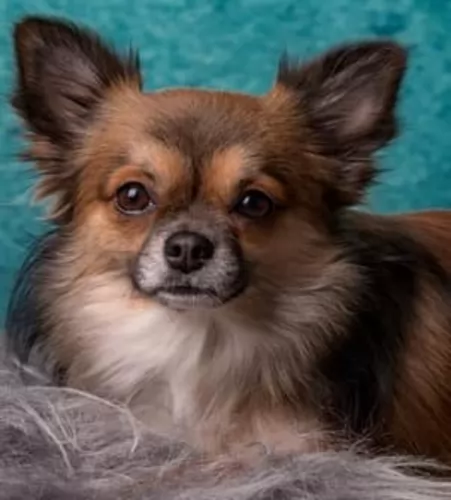 The Chihuahua is such a feisty, courageous, confident little dog who also believes that he is part- lion. He is loving, sweet and gentle and just loves being picked up and petted non-stop. He looks up at you, moving his front paws up and down to tell you that he wants to be picked up.
The Chihuahua is such a feisty, courageous, confident little dog who also believes that he is part- lion. He is loving, sweet and gentle and just loves being picked up and petted non-stop. He looks up at you, moving his front paws up and down to tell you that he wants to be picked up.
He is in 7th heaven when he can be cuddled up in your lap. You just have to teach your children to be very careful with him and not enter into games with him that are too rough and tumble. Tiny he may be but he makes a great watchdog too, barking and alerting you to strangers.
His small size makes him perfect for life in the city or in the countryside. Just be careful when in the countryside lest an Eagle or Owl scoop him up and carry him off to some faraway nest.
He doesn’t need a great deal of exercise either and you can actually keep him happily busy with some games indoors. He’ll always welcome walks with you though.
This small dog is full of life and confidence and he is ready to be your constant, loving companion.
 Your Phung San dog is a strong-willed dominant type of dog, and training and socialization will do him the world of good in terms of making him obedient and well mannered. He is loyal, faithful and loving and protects and guards those he loves.
Your Phung San dog is a strong-willed dominant type of dog, and training and socialization will do him the world of good in terms of making him obedient and well mannered. He is loyal, faithful and loving and protects and guards those he loves.
Some people say these dogs aren’t a good choice for novice dog owners, but dogs essentially turn out the way their owners are. The right upbringing will ensure your Pungsan Dog is a good pet for new owners and for families with children.
Do research and you’ll see that these beautiful dogs make splendid pets and companions.
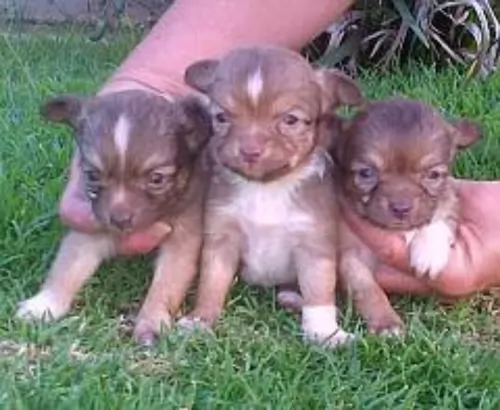 With good care, you’ll have your long haired Chihuahua with you for a long time – 15 years and longer.
With good care, you’ll have your long haired Chihuahua with you for a long time – 15 years and longer.
Make sure to de-worm your Chihuahua. Worms and other parasites can be deadly for your pet and the vet will do preventative deworming on a regular basis.
You Chihuahua will need to be vaccinated when he is a puppy and even when he is an adult, although less often. These vaccines will protect your Chihuahua from the likes of parvo, distemper and rabies. Have your chihuahua spayed or neutered.
There are so many puppies in the world who can’t find homes. Desexing your Chihuahua is a responsible way to ensure your pet doesn’t have puppies. Spaying and neutering can actually be beneficial for your dog’s health.
 Able to get to 13 or 14 years of age, the Pungsan dog enjoys good health, but there are some dog diseases that it is good to be aware of -
Able to get to 13 or 14 years of age, the Pungsan dog enjoys good health, but there are some dog diseases that it is good to be aware of -
Hip Dysplasia can mean no more games for your pet. It’s a disease that can have a large impact on your pet’s quality of life. It’s not reserved for old dogs either but it affects medium to large breed dogs.
Diet, weight of dog, genetics and environmental factors can all cause hip dysplasia, and while the symptoms are often subtle at first, you’ll see a limp starting and your dog holding his leg up off the ground. The severity of symptoms can change from day to day but the pain can be severe and you will need to get your pet to the vet.
This is an eye problem where the eyelids roll too far inwards and then scrape on the surface of the eye, possibly leading to corneal scarring and painful eye infections.
This is a life threatening illness where the stomach bloats up with gas and the stomach can actually twist. Your pet will be restless, panting and acting out of character and absolutely no time should be wasted getting your pet to the vet.
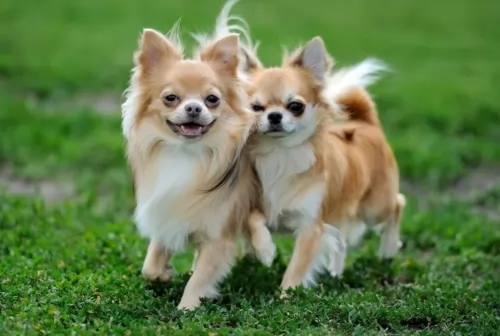 The pint-sized long-haired Chihuahua isn’t going to take up too much of your time in terms of grooming. Make sure you brush him at least twice a week to ensure his long hair doesn’t tangle. Small dogs are prone to dental problems, so try and brush his teeth at least 2 or 3 times a week with special doggy toothbrush- and toothpaste.
The pint-sized long-haired Chihuahua isn’t going to take up too much of your time in terms of grooming. Make sure you brush him at least twice a week to ensure his long hair doesn’t tangle. Small dogs are prone to dental problems, so try and brush his teeth at least 2 or 3 times a week with special doggy toothbrush- and toothpaste.
Take your puppy Chihuahua to the vet for his regular vaccinations to prevent him getting dangerous illnesses.
Feed him a high quality dog food. He is a high energy dog so buy high quality food that caters for small, lively dogs. Try and feed him such home made food from time to time. Remember that with small dogs, high-salt diets can contribute to kidney problems.
Never overfeed your Chihuahua as obesity opens up major health problems in Chihuahuas.
 This is an active, energetic dog that will require some vigorous physical activity each day. While a walk is an excellent form of exercise, he will need something more hectic. You can take him to the park and allow him to run free off his leash, take him with you on your hikes and play ball- or frisbee games with him.
This is an active, energetic dog that will require some vigorous physical activity each day. While a walk is an excellent form of exercise, he will need something more hectic. You can take him to the park and allow him to run free off his leash, take him with you on your hikes and play ball- or frisbee games with him.
Your Pungsan sheds quite a bit because the fur is thick and you will need to have him brushed at least twice a week. Turn this brushing session into a proper grooming session. There are several things to check during these brushing sessions which your pet will love -
Run your hands over him and check for any unusual lumps.
Look inside his mouth and check his teeth. Your pet can’t tell you that there is a rotting tooth causing tremendous pain and illness.
Check the inside of his ears and make sure they aren’t red and clogged with excess wax and debris. There are ways to clean them and if you don’t know how or you don’t want to, allow a professional groomer to check his teeth, inside his ears and also trim his nails.
Make sure he has an excellent diet. There are some really good commercially manufactured dog foods that have the right balance of vitamins and minerals in them. Give him some home-made food too. Nothing exotic and spicy – just wholesome, simple food that won’t upset his stomach – boiled chicken, brown rice or pasta and some sweet potato, carrots and spinach. Mix these into his kibble from time to time. Once in a while you can also give him some raw meat. Make sure he has easy access to fresh, cool water.